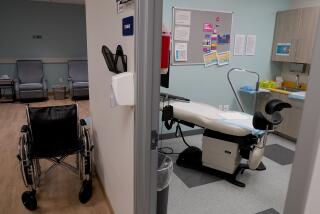Parents-to-be face legal maze
- Share via
WHEN the Massachusetts Supreme Judicial Court voted to legalize gay marriage in 2003, its opinion rested squarely on the argument that determining the best interests of a child “does not turn on a parent’s sexual orientation or marital status.”
Three years later, the top court in neighboring New York also cited the welfare of children — but took precisely the opposite stance. The state could limit marriage to heterosexuals, the Court of Appeals ruled in July, because lawmakers “could rationally believe that it is better, other things being equal, for children to grow up with both a mother and a father.”
Given those divergent rulings, it is little wonder that gays and lesbians attempting to produce children through artificial means confront a legal landscape as varied as the 50 states.
Legal relationships involving surrogates, egg donors and gay parents sit tenuously at the nexus of two highly charged and underdeveloped areas of the law — gay rights and assisted reproductive technology (ART).
A lack of statute and court precedent in each area has made it vital for intended parents to define their relationships with surrogates and egg donors in tightly drawn contracts.
“The paper agreements that bind together the actors of ART are alarmingly fragile,” wrote Laura M. Katers in Wisconsin Law Review. “Law trails behind, while medical technology charges into the future.”
Judicial rulings and practices have varied from state to state, and even judge to judge.
Nine states, including California, clearly allow same-sex couples to adopt, a necessary legal component of many surrogacy arrangements. Four clearly forbid it; one of them, Florida, also explicitly prohibits gay singles from doing so.
Eleven states and the District of Columbia, meanwhile, ban at least some forms of surrogacy, while six states explicitly permit it. The other states have unclear or conflicting laws or precedents, according to the Human Rights Campaign, which advocates for gay rights.
As a result, the ability of intended parents to become legal parents can depend greatly on where their embryos are created and where their children are born.
Case law concerning surrogacy has developed rapidly in California, where a series of opinions by the state Supreme Court has established that the intended parents of children are the natural and legal parents, regardless of their genetic roles. In its latest ruling on the topic, the court last year ordered a lesbian who was not a biological contributor to pay child support for the twins she had raised with her former partner.
“We perceive no reason why both parents of a child cannot be women,” the court wrote.
Over the last decade, a cottage industry of lawyers has emerged to help guide prospective parents through the uncertainties. In some states, they have taken advantage of the legal vacuum to invent procedures that give gay parents the same standing as straight ones.
They have persuaded some judges, for instance, to grant pre-birth declarations of parentage to gay couples participating in surrogacy arrangements. Months before the child is born, the prospective parents petition the court to declare them the legal parents, and the surrogate voluntarily abandons her parental rights.
Depending on the state, that can allow the names of two men or two women to be listed as parents on a birth certificate. And it gives the parents an added level of protection against a surrogate who declares after birth that she wants to keep the baby.
“Even if you have a contract,” said Nidhi Desai, a reproductive technology lawyer in Chicago, “there are a lot of judges out there who, if a surrogate changes her mind, may be apt to say we’re going to place the child with a mother.”
kevin.sack@latimes.com
More to Read
Sign up for Essential California
The most important California stories and recommendations in your inbox every morning.
You may occasionally receive promotional content from the Los Angeles Times.













